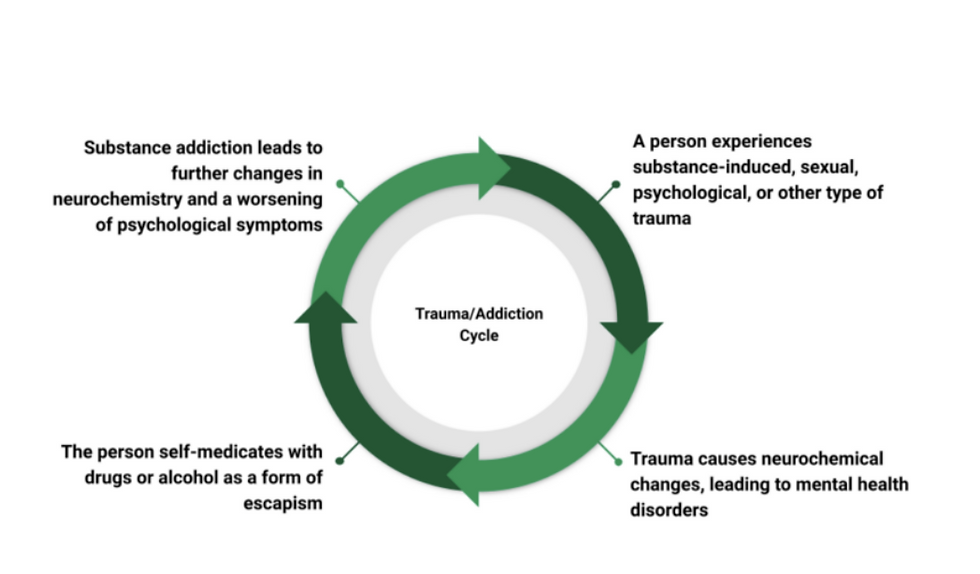Substance Use and Trauma: Why Trauma Therapy Is the Missing Piece in Recovery
- Zach Walters

- Jul 29
- 4 min read
We know that behind every struggle with substance use, there’s a deeper story. One shaped not by weakness or there being anything wrong with you, but by pain, survival, and the complex ways our nervous systems adapt to overwhelming experiences. Instead of asking, "Why the addiction?" a trauma-responsive lens invites us to ask, "Why the pain?"
So often, substance use is not the problem itself, but a response to pain that hasn’t yet had space to be seen, processed, and held with care. Trauma—whether obvious or hidden—frequently plays a central role in how and why substance use takes hold. Understanding this connection is key not only to supporting recovery but to creating a path toward deep, lasting healing.
Trauma and Substance Use: The Hidden Connection
A large percentage of individuals navigating substance use challenges have experienced trauma at some point in their lives. This may include:
Childhood abuse or neglect
Sexual assault or domestic violence
Loss of a loved one
Medical trauma
Emotional abandonment or chronic instability
Living in systems shaped by racism, poverty, or oppression
For some, trauma is a single, catastrophic event. For others, it’s a slow accumulation of small, persistent wounds—a childhood marked by emotional absence, constant stress, or unmet needs. These experiences leave a lasting imprint on the brain and nervous system, often keeping the body locked in survival mode long after the danger has passed.
Substances can enter this picture as a form of self-medication. Alcohol may quiet the inner chaos. Cannabis may soften hypervigilance. Prescription medication may provide temporary relief from flashbacks or panic. In the absence of safer tools, substance use may become the most accessible way to manage unbearable emotions or a chronically dysregulated nervous system.
Understanding the Trauma-Addiction Cycle
Initially, substances may offer comfort or control. But over time, their relief fades. Instead, the individual is often left facing:
Increased emotional numbness
Physical health deterioration
Strained or broken relationships
Guilt, shame, or disconnection from self
This creates a reinforcing cycle: trauma leads to substance use as a coping mechanism, but the consequences of substance use may generate further trauma—deepening emotional pain and reinforcing a sense of isolation or hopelessness.
At Woven Wholeness, we help clients recognize this cycle not through judgment, but with compassion. Awareness is the first step toward breaking the loop—and toward building a recovery rooted in resilience and care.

What Is Trauma-Responsive Treatment?
Trauma-responsive care goes beyond being informed about trauma—it actively works to create environments, relationships, and treatment models that respond to its impact. It shifts the focus from “What’s wrong with you?” to “What happened to you—and what do you need to feel safe and supported in healing?”
Core principles of trauma-responsive therapy include:
Safety: Prioritizing emotional and physical safety for clients at all times
Transparency and Trust: Building authentic, collaborative relationships
Empowerment and Choice: Honoring client autonomy and pacing
Cultural Humility: Acknowledging how trauma is shaped by identity, marginalization, and lived experience
Peer Support: Including voices of those with lived experience
Whether we’re using somatic therapy to support nervous system regulation or techniques like Brainspotting to process trauma memory and access deeper healing pathways, our approach is always rooted in respect and responsiveness. You won’t be pushed into painful memories before you’re ready. Instead, we’ll build the foundation for healing together, step by step.
Why Trauma-Responsive Care Is Essential in Addiction Recovery
Traditional addiction treatment models sometimes focus exclusively on abstinence or behavior change. But without addressing the trauma driving the behavior, recovery often feels incomplete—or unsustainable. A trauma-responsive approach invites us to see substance use not just as a habit to break, but as a signal of deeper pain that needs tending.
At Woven Wholeness, our clinicians integrate a variety of therapeutic modalities to support the whole person. This may include:
Art therapy to give voice to what words can’t express
Somatic practices to reconnect with the body and build felt safety
Brainspotting to process trauma stored in the nervous system
Parts work and inner child healing to rebuild trust within the self
Mindfulness and nervous system regulation to reduce overwhelm and increase resilience
Healing is not about “fixing” what’s broken. It’s about reclaiming your wholeness—your story, your identity, your aliveness.
Healing Is Nonlinear—and That’s Okay
Recovery doesn’t unfold in a straight line. Some days bring clarity and ease; others feel like you’ve taken three steps back. This isn’t failure—it’s the natural rhythm of trauma healing.
A trauma-responsive framework honors this reality. We help our clients move at their own pace, develop a sense of internal safety, and begin to reconnect with a life they can truly inhabit. This means not rushing to dive into painful memories before you feel resourced, and not measuring progress by abstinence alone. Healing is more than symptom reduction—it’s the rediscovery of presence, agency, and connection.
You Deserve More Than Symptom Management
If you or someone you care about is struggling with substance use, it’s important to know that recovery isn’t just about willpower. It’s about tending to wounds that were never meant to be carried alone.
At Woven Wholeness, we offer trauma-responsive therapy that looks beneath the surface to understand what the substance is doing for you—and how to meet those same needs through connection, regulation, and self-compassion. Our clinicians are trained in trauma modalities like EMDR, brainspotting, somatic therapy, and art therapy, allowing us to customize care based on your unique experiences and nervous system needs.
Whether you’re navigating anxiety, trauma, or substance use, we’re here to walk alongside you—not as fixers, but as companions in healing.
Ready to Take the First Step?
You deserve support that sees all of you—not just your symptoms. If you’re ready to explore healing in a safe, compassionate space, we invite you to book a free consultation.
Let’s begin the journey together.







Comments